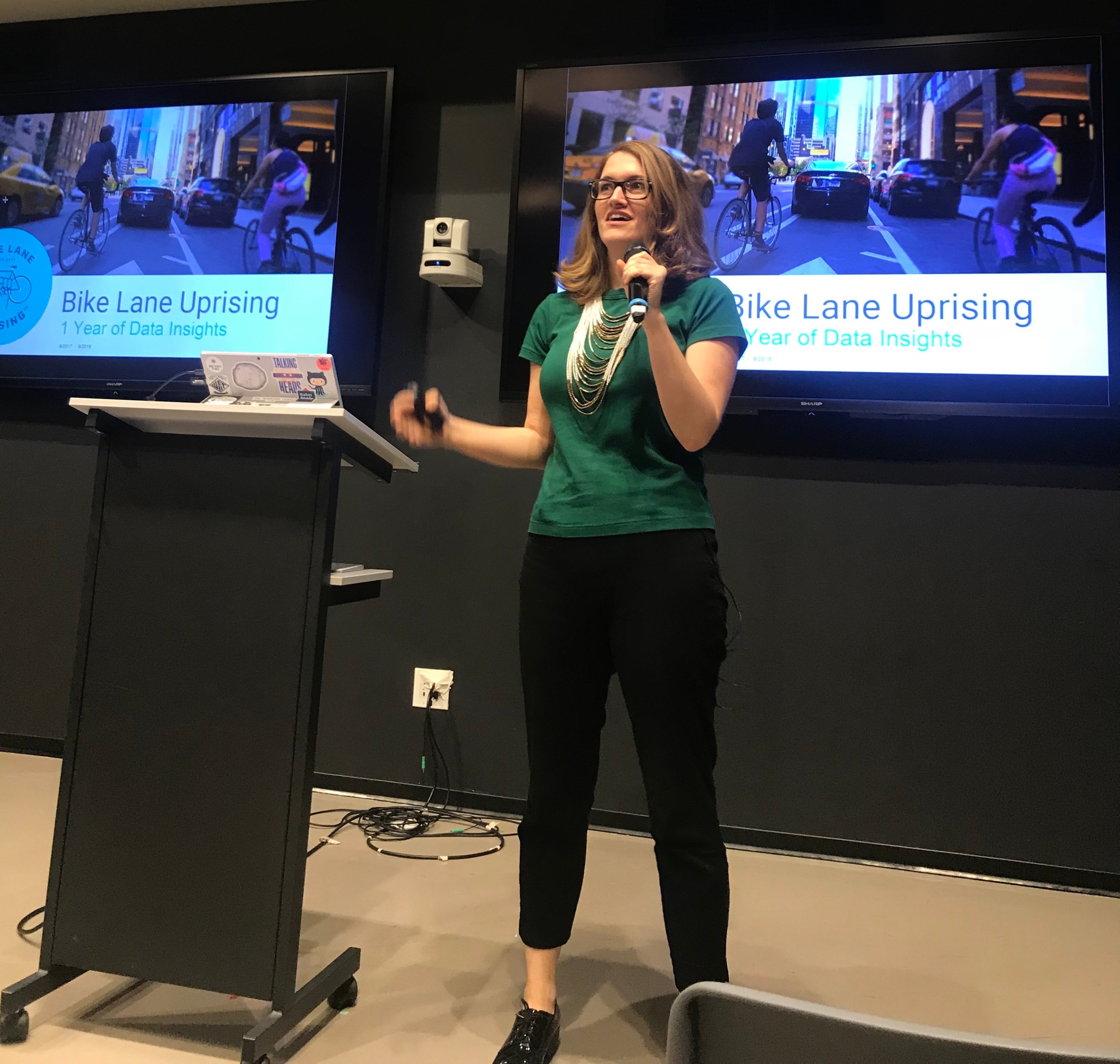If you ride a bike in Chicago, chances are you’ve encountered cars and trucks blocking your path on a bike lane, perhaps several times in one day. Most likely you were momentarily disgruntled, and then you went on with your business.
But one day in June 2016, when Christina Whitehouse was almost run over by a commercial truck driver while standing in a bike lane waiting for a stoplight, she decided she'd had enough of motorists being oblivious about cyclists' safety. That experience led her to start Bike Lane Uprising, a crowdsourced civic tech platform intended to make it easy to report bike lane obstructions.
She shared her experience about starting the organization at Tuesday night’s Chi Hack Night, a free weekly event that promotes civic engagement through data, design, and technology.
Whitehouse recalled feeling as if she certain to go under the back wheels of the truck that day, but she said she managed to push herself and the Divvy bike she was on away from the vehicle. She then chased after the trucker and confronted him on Lower Wacker Drive. Whitehouse said that when she told the driver he had almost run her over, he seemed completely apathetic.
That experience stayed with her, and her feelings intensified a few weeks later when another truck driver fatally struck Virginia Murray, 25, while she was riding a Divvy bike in Avondale. “That could have easily been me,” Whitehouse said.
That fall, another truck driver fatally struck Northwestern University student Chuyuan Qiu near a building where Whitehouse attended classes. Truckers killed two other young people on bikes in Chicago that year.
That fall Bicycling Magazine ranked Chicago as the best U.S. cycling city, which Whitehouse said didn’t seem to reflect the realities on the ground.
These events, and learning more about the challenges of reporting unsafe practices by drivers prompted Whitehouse to start Bike Lane Uprising in summer 2017. The process is fairly simple, she said. A user signs up to be a contributor on the site, documents the bike lane obstruction, and then submits it on the site.
“We just had our one-year anniversary,” Whitehouse said. “One person actually couldn’t attend because he was doored.”
As of the end of September 2018, the site had seen close to 5,000 submissions. Bike Lane Uprising has also spread to over fifty other cities and countries. So far 79 percent of all submissions are from Chicago, according to data Whitehouse shared.
After analyzing the data of types of vehicles obstructing bike lanes, Whitehouse was struck that 6 percent of the reported vehicles were city vehicles.
“If the city of Chicago is not setting a good example, then what message are we sending?” she asked.
According to the data top repeat offenders included Uber and Lyft drivers, cabbies, and post office workers.
Whitehouse shared some positive outcomes that have happened since she launched the site. After drivers for Italian beef purveyor Buona Beef were reported to the site for parking in bike lanes five different times, Whitehouse reached out to the company. The Buona Beef leadership was not only apologetic about the issue, but they asked to cater Bike Lane Uprising’s first event. The portable toilet company Oui Oui Enterprises is another company that Whitehouse said responded to complaints by promising to clean up their act.
Whitehouse said that one of the ways the site has turned out to be helpful is by tracking repeat offenders.
In August of this year, a right-turning truck driver killed Chicago Athletic Club employee Angela Park, 39, while she was riding her bike in the West Loop. The driver was from Lakeshore Recycling, a repeat offender on Bike Lane Uprising’s database. At least 14 submissions have been about Lakeshore Recycling.
After Whitehouse’s presentation, audience member asked a few questions. As someone who lives on the Southwest Side, I asked how the site reaches underserved communities, or people that don’t identify as “cyclists.”
Whitehouse said she has done outreach to groups like Slow Roll Chicago to increase submissions and continues to explore how to make Bike Lane Uprising even more accessible to more communities. She also mentioned being aware of the reluctance cyclists who are undocumented may have about sharing any personal information in reporting bike lane infractions.
“Ultimately, we are trying to put [Ghost Bikes Chicago's] Kristen Green out of business,” Whitehouse said. “No more ghost bikes.”
![]()
Did you appreciate this post? Consider making a donation through our PublicGood site.




